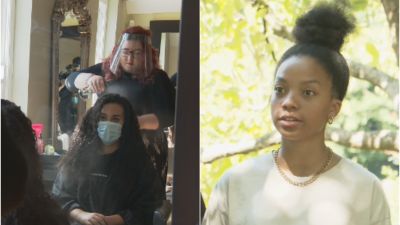'I feel invisible and forgotten': Women speak out about challenges in getting black hair treated

By ITV Wales journalists Tahmeena Alam and Charanpreet Khaira.
Black women have told ITV News the difficulty in finding a hairdresser to treat their hair makes them feel "forgotten" and "invisible".
It comes amid calls to make afro training compulsory in hairdressing qualifications.
Tia, who is 15, grew up having her hair done at home before teaching herself because she couldn't find a hairdresser who could cut and treat afro hair.
''Up until a certain age, I never went to hairdressers because nowhere could deal with my hair. I had to take the initiative to learn. It was just so difficult to try and find somewhere to do my hair.''
''I feel kind of forgotten, invisible.''
Her father Jason, said even finding products suitable for their hair can be a difficult process.
''I used to do her hair all the time as a child and just the accessibility and affordability to maintain her hair. You can find products for European hair, but for Tia's hair or my hair we just couldn't find products.''
Mel travels 100 miles from Aberystwyth to Cowbridge just to have her done. She says being told by hairdressers that they 'can't do her hair' has left her feeling humiliated and degraded.
''Hairdressers don't realise that perhaps the way that they make you feel by the faces they pull at your hair or the way they're like no I couldn't do that it makes Black women especially and mixed race women like myself feel that they are less than, that they're not the normal.''
Since 2015, as part of the NVQ Level 2 hairdressing qualification, although students are taught the theory of cutting ''extremely curly black hair'', it is not compulsory for them to have actually worked on this hair type.
Students have to demonstrate they have worked on three out of the four hair types to pass the course.
City and Guilds, the body behind the qualification, said because 4.5% of the population in the UK is black or dual heritage, making it compulsory to do practical training on afro type hair would ''significantly disadvantage many students - particularly those living outside of the UK’s major cities.''
With so few hairdressers offering treatment for black hair, many feel education is the root of the problem. But it is not just about getting her hair cut or treated - but beauty standards as well.
An exclusive ITV poll revealed that 53% of people from black and ethnic minority backgrounds thought the beauty industry has a culture of racism.
"It was the number one thing I wanted to change about myself"
Tia said growing up she always wanted to change her afro hair because it wasn't deemed "beautiful and silky".
''Everyone without invitation is touching your hair, making comments that it's unhealthy. I never wanted to wear my hair out because people would think it was dirty. The reaction I got recently was people saying i'm Michael Jackson.''
''Growing up seeing what was seen as the beauty standard which was blonde or brunette straight hair, I knew I wouldn't fit in. Even when I straightened my hair I knew it wouldn't go as soft, and silky as everyone I was seeing. It was affecting my confidence.
Tia isn't alone. Other black women have told ITV News about similar experiences.
''I was really embarrassed about my hair I didn’t want anyone to see it so I put my cardigan onto my head to cover it'' - anonymous
''As a black person, your relationship with your hair will always be complicated. You have the pressure from white people to look white - but you also have the pressure from your own black community to be the correct type of black.'' - anonymous
While many feel education is key, World Afro Day aims to celebrate black hair to change negative attitudes, raise awareness and normalise afro hair across society.
Now in its fourth year, the day will be marked across the globe on September 15.